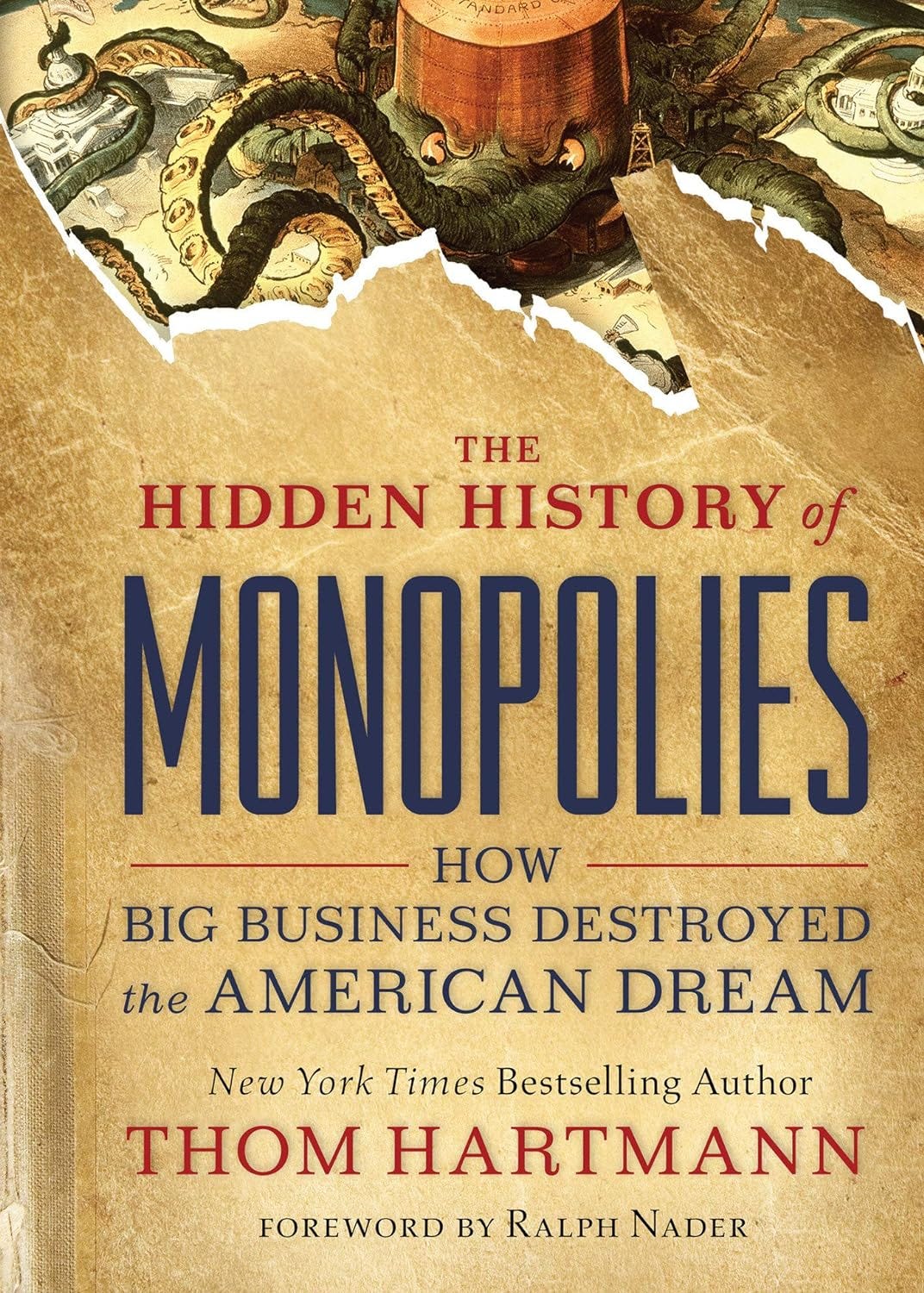Less for Labor Means More for CEOs
Your weekly excerpt from one of my books. This week: "The Hidden History of Monopolies: How Big Business Destroyed the American Dream"

Less for Labor Means More for CEOs
Monopoly also produces extremes of inequality, and extreme inequality kills societies.
Richard Wilkinson and Kate Pickett of the Equality Trust in the UK have done extensive research on the topic, leading to two best-selling books and a brilliant website.51 They document in startling detail, going nation by nation and, in the United States, state by state, how inequality damages the lives of everybody except those who live in massive wealth bubbles at the top.
It’s not the poverty that extreme inequality produces that does much of the damage. Instead, because we’re wired like all mammals to understand and perceive both fairness and unfairness, when we find ourselves in unfair situations, our interactions with the world and each other become distorted. (These experiments have also been done with dogs and monkeys,52 among others; every mammal studied reacts negatively to inequality and unfairness.)
Wilkinson and Pickett have documented how, as society becomes progressively less fair and more unequal, a whole host of cultural and psychological problems ripple across the culture. These are not caused by poverty, but simply by inequality, and include the following:
Less social cohesion and trust among people More teenage pregnancies and STDs
More crime, from shoplifting to murder to mass shootings
Decreased worker productivity
Increased suicide
Lower grades in school
Increased mortality and morbidity, shorter life spans
Increased obesity and the diseases associated with it
Higher levels of mental illness, including diseases thought to be totally “organic,” like schizophrenia
Lower rates of social and political engagement
Less empathy and altruism among and between individuals (making for a more brutal society)
Instead of doing anything about this, in country after country, state after state, the main driver of inequality is market concentration, also known as monopoly and oligopoly. The tax cuts and hoarding are the result of the political and economic power this market concentration brings.
Lina Khan and Sandeep Vaheesan produced a brilliant scientific analysis of this phenomenon published in the Harvard Law and Policy Review,53 and followed it up with a more consumer-friendly analysis in the Washington Post.54
Simply using monopoly labor market power, for example, senior executives at Google, Apple, Intel, Intuit, Pixar, and Adobe had “stolen” an estimated $3 billion from 60,000 workers when the illegal collusion between the companies was uncovered by the Justice Department in 2010.
They reported on how 20,000 nurses in Detroit lost an estimated $400 million between 2002 and 2006 because of hospital consolidation and collusion among hospitals in hiring.
While these examples represent actual crimes against per- sons by these giant corporations, trillions of dollars have been upwardly redistributed from working people to the top 1% over the past four decades by corporate giants in ways that are generally less visible and perfectly legal but wouldn’t work without high levels of market concentration.
Much of it is because the political and economic power that comes with massive corporate oligopolies allows CEOs and senior executives to take pretty much whatever paycheck they want. As the Economic Policy Institute notes, “From 1978 to 2018, CEO compensation grew by 1,007.5%, far outstripping S&P stock market growth (706.7%) and the wage growth of very high earners (339.2%). In contrast, wages for the typical worker grew by just 11.9%.”55
In the preceding 40 years, prior to Reagan’s introduction of trickle-down neoliberalism, working people actually saw their wages grow at a higher rate than the CEO class (although CEOs were doing just fine, thank you very much). But Reagan’s cutting the top income tax rate from 74% to 28% gave CEOs carte blanche to take as much as they could.
As the Wall Street Journal revealed in 2007, William “Dollar Bill” McGuire, the CEO of insurance giant UnitedHealth, took over a billion dollars in compensation.56 One could argue that much of it came from the company telling people, “No, we’re not going to pay your claim; we just discovered you had a preexisting condition (or you hit your lifetime limit).” His successor, Stephen J. Hemsley, walked away with hundreds of millions.57
America used to have a thriving middle class; in 2019, fully 40% of Americans struggled to pay for food, housing, utilities, or medical care.58 Half of adult Americans have no retirement savings, and nearly two-thirds would be wiped out financially with an unexpected expense like a medical bill or accident costing only $500.59
Meanwhile, even entrepreneurs are being wiped out. Khan and Vaheesan document how creation of new businesses in America dropped by 53% between 1977 and 2010.
What has changed so much in America in the past 40 years? Simple. Reagan and the Supreme Court put Robert Bork’s theories into effect, and our formerly diverse and competitive corporate landscape has been wiped out, replaced by a few hundred giant corporations that control nearly every aspect of our economy—and our politics.


